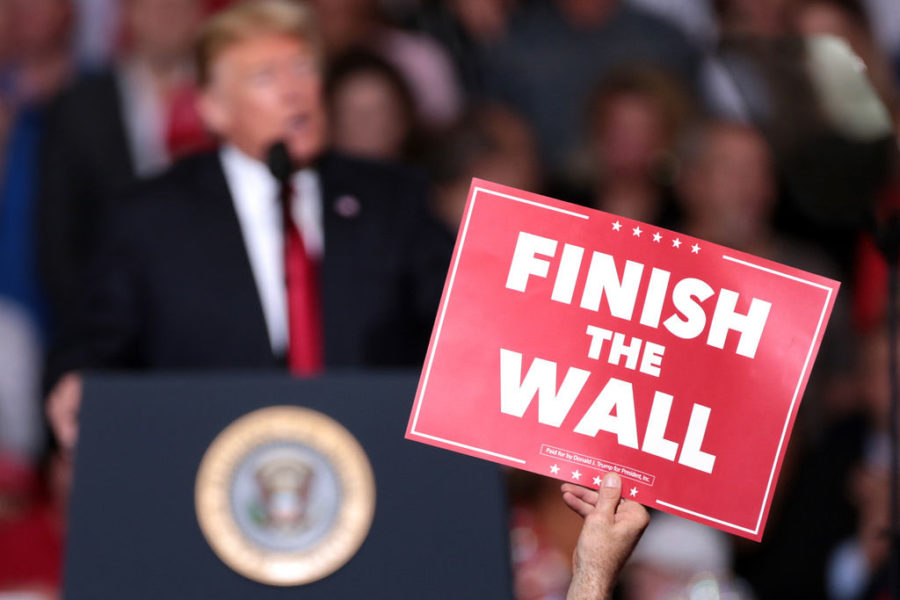Trump to declare national emergency, avoid shutdown
Finish the Wall sign at a Make America Great Again campaign rally for President of the United States Donald Trump at International Air Response Hangar at Phoenix-Mesa Gateway Airport in Mesa, Arizona.
February 14, 2019
President Donald Trump announced Thursday he would sign a deal to avoid another government shutdown and issue a state of national emergency, allowing him to use Federal Emergency Management Agency (FEMA) for his southern border wall.
When asked about his reaction to the president saying that he would declare a national emergency, Mack Shelley, chair of Iowa State’s political science department, said the move might help the president with his base.
Shelley said because Trump is seen as someone who takes action, the move could be beneficial. In the end, he sees it as very characteristic of the president.
“Trump wants to be in a position where he’s pushing forward,” Shelley said.
Rep. Steve King announced his support for the emergency declaration in a statement Thursday, saying Trump was on “solid Constitutional ground in doing so.
“I have been asking the President to declare a National Emergency to address border security for months, and I support his doing so today,” King said in his statement.
In a compromise between Republicans and Democrats, a small, bipartisan group of lawmakers proposed an agreement on legislation that would fund the government through September. At time of publication, Trump has indicated he will sign the deal despite his dissatisfaction with not receiving as much funding for fencing along the southern border as he originally requested.
The deal would allocate $1.375 billion toward fencing projects, intending to put up 55 miles of barriers. The president originally asked for $5.7 billion in order to build nearly 200 miles of fencing.
Shelley said the president would likely receive pushback from Congress and outside sources when declaring a national emergency and predicted the process would face legal challenges immediately.
“There are probably about 50 lawyer groups centered around D.C. and elsewhere that already have briefs ready,” Shelley said.
Shelley said eminent domain issues could also cause problems for the president. The barrier would have to be built across private properties on the border, which he said could cause resentment among landowners that may support the president.
Democrats also accomplished some of their goals with the bill. The original amount of $5.7 billion for fencing was reduced to $1.375 billion, which Senior Lecturer Kelly Shaw saw as a political loss for the president. He said the shutdown played a role in why the agreement would be signed regardless.
“The optics of shutting down the government for a policy justification is pretty extraordinary in American politics,” Shaw said.
Jacob Minock, the president of Iowa State College Republicans said he is glad the government avoided another shutdown but wishes more could have been done.
“I’m not going to say it’s a bad compromise,” Minock said. “I would have hoped we would have had a bit more in the middle. It seems like Republicans are giving up a bit more than the Democrats [in the budget.]”
Some representatives expressed their dissatisfaction with the deal itself and how it has been pushed through Congress at a fast pace.
Congressman Chip Roy from Texas tweeted Thursday, “This ‘deal’ provides de facto amnesty for anyone claiming to be even in the household of a potential sponsor of an unaccompanied alien minor…”
The reference was about Section 224 of the bill, which says that no funding received from the bill would be usable by Immigration and Customs Enforcement (ICE) to place sponsors of unaccompanied children in detention or initiate removal proceedings against them.
The congressman also expressed disagreement with how fast the bill was intended to be up for a vote. The funding piece is 1159 pages long and was released Wednesday night. It passed the Senate on an 86-13 vote and the House of Representatives on a 300-128 vote Thursday.
Shelley said the bill was long, but it isn’t an uncommon situation to have pieces of legislation like the one being proposed. Nevertheless, he said preferably there should be more time to look at all bills.
“It’s a terrible way to legislate,” Shelley said.

















